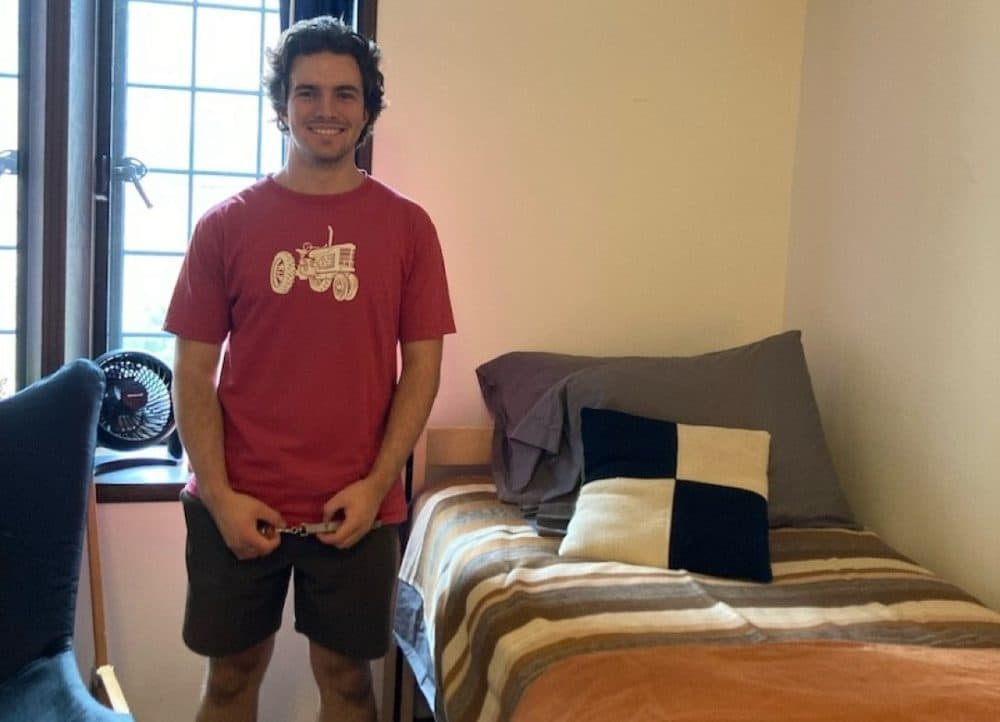Advertisement
Commentary
I didn't cry when I took my son to college. Then I got home

I don't cry.
I am a crier and yet I don’t cry when I drop my son off at college. We all go, my wife, Cathlin, and our daughter, Pickle (her nickname), and I don’t cry, not when we pack the car.
I don’t cry when we hit the highway, heading south. I don’t cry mostly because Hardy and Pickle are arguing in the backseat and I am reminded of another drive so many years ago when they were still quite young and arguing and annoying me from the backseat. I pulled off the highway into a dingy gas station, told them to get out of the car, sat them down on a curb and drove away.
It is the stuff of legend now, the time Dad left the kids at a roadside curb (Cathlin, of course, was not with us that day) and didn’t return for hours or a day. In fact, it was only two minutes and I didn’t drive out of sight, just 20 yards or so.
I don’t cry because I am wondering about the new father I once was, so exhausted and confused I would resort to scaring my children to get them to behave. Thankfully, Hardy and Pickle laugh about that memory now, a family heirloom like so many other moments, both good and bad.
I am a crier and yet I don’t cry when I drop my son off at college.
I don’t cry when we pull up to the college and unpack the car. I don’t cry when we enter Hardy’s dorm room, or when I run back downstairs to park the car so other parents can pull into my spot in front of the dorm.
I don’t cry after parking the car when I encounter another family saying goodbye, the college freshman hugging her little brother so hard she lifts him into the air, his small sneakers dangling as his body shakes with tears. I almost cry when I see the father standing by the side of the car, a burly man in cut-off sleeves with a huge tattoo circling his calf. He leans against the car with one arm, while his body is folded in two and his tears spill onto the sidewalk.
I almost cry then, but not quite.
I don’t even cry in the "tunnel of tears," a name Pickle gives to a small alcove that connects the dorm courtyard to the street. Parents linger there after their final goodbye so their children can’t see them break down as they rest their heads against this solid brick wall and let loose.
Advertisement
I don’t cry on the drive home or when I pull into the driveway and see the house, listing, it seems, as it prepares to welcome back three, not four. I don’t cry when we walk through the door and the dog rushes us and then pauses after greeting us one by one, and looks expectantly at the doorway for another person.
I don’t cry when we walk through the door and the dog rushes us ... and looks expectantly at the doorway for another person.
I don’t cry that night, while lying in bed wide awake recalling the Halloween when Hardy dressed as a lobster, the costume made entirely out of red Solo cups and plates, a creation made by Cathlin. I don’t cry thinking about Legos, the "Redwall" books, picking up Hardy at preschool when each day for nearly six months, he made me sit at a small table in the hallway and feed him a maple yogurt and read "Animalia" to him while all the other parents headed to the playground.
I don’t cry when I remember Cathlin’s breast cancer diagnosis, when all we knew was fear but we sat down with Hardy because we wanted to be open with him about the hard road ahead. And 7-year-old Hardy looked at us and nodded, and then got out his crayons and filled a page with cancer villains, each one with a sinister mustache, and then slashed X’s through them.
I don’t cry thinking about laughing with him, cooking with him, asking him to stop reading me the news headlines each morning about the horrors of the world.
I don’t cry at any of these moments, and although I wonder why, I have no answers.
I don’t cry on that first morning at home when I wake up, make my coffee and walk downstairs to my writing room. I light a candle and reach for my pencil and pad. But then I sense a movement behind me and turn to look at the rocking chair in the corner and I see Hardy there, at age 6 or 7. He did not visit every morning but often enough, up early like me. He always brought a book with him and snuggled in the chair, reading quietly while I wrote. And when I finished and he put down his book, we would walk up the stairs together, ready to greet the day.
I remember walking up the stairs, his small hand in mine, knowing that whatever happened that day, all I had to do was recall this moment with my son and everything would be okay.
And that is when I begin to cry.
